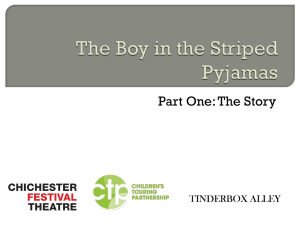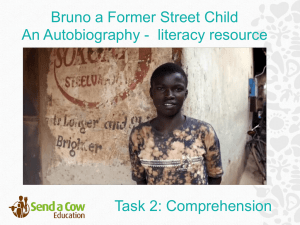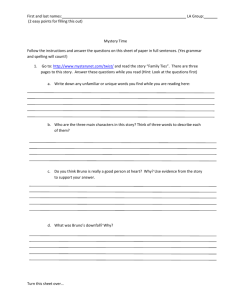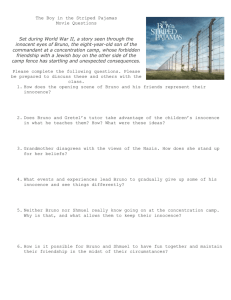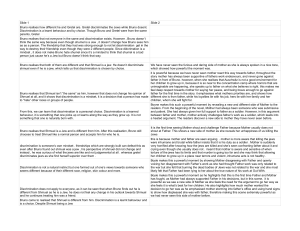The Boy in The Striped Pajamas Exploring an innocent perspective.
advertisement
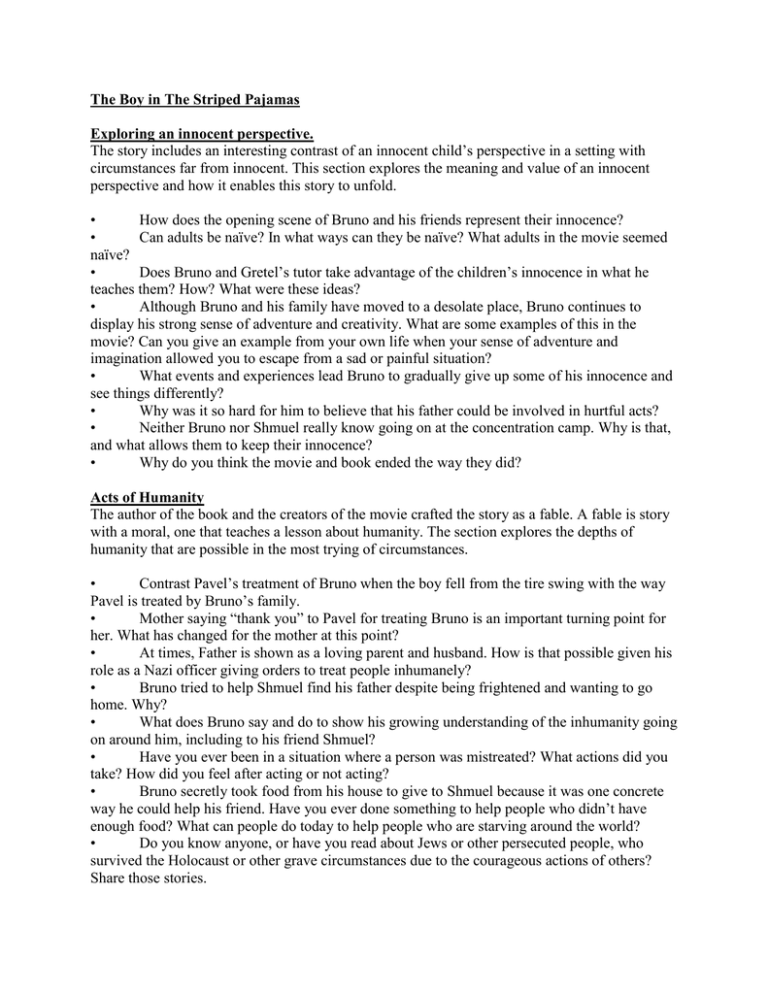
The Boy in The Striped Pajamas Exploring an innocent perspective. The story includes an interesting contrast of an innocent child’s perspective in a setting with circumstances far from innocent. This section explores the meaning and value of an innocent perspective and how it enables this story to unfold. • How does the opening scene of Bruno and his friends represent their innocence? • Can adults be naïve? In what ways can they be naïve? What adults in the movie seemed naïve? • Does Bruno and Gretel’s tutor take advantage of the children’s innocence in what he teaches them? How? What were these ideas? • Although Bruno and his family have moved to a desolate place, Bruno continues to display his strong sense of adventure and creativity. What are some examples of this in the movie? Can you give an example from your own life when your sense of adventure and imagination allowed you to escape from a sad or painful situation? • What events and experiences lead Bruno to gradually give up some of his innocence and see things differently? • Why was it so hard for him to believe that his father could be involved in hurtful acts? • Neither Bruno nor Shmuel really know going on at the concentration camp. Why is that, and what allows them to keep their innocence? • Why do you think the movie and book ended the way they did? Acts of Humanity The author of the book and the creators of the movie crafted the story as a fable. A fable is story with a moral, one that teaches a lesson about humanity. The section explores the depths of humanity that are possible in the most trying of circumstances. • Contrast Pavel’s treatment of Bruno when the boy fell from the tire swing with the way Pavel is treated by Bruno’s family. • Mother saying “thank you” to Pavel for treating Bruno is an important turning point for her. What has changed for the mother at this point? • At times, Father is shown as a loving parent and husband. How is that possible given his role as a Nazi officer giving orders to treat people inhumanely? • Bruno tried to help Shmuel find his father despite being frightened and wanting to go home. Why? • What does Bruno say and do to show his growing understanding of the inhumanity going on around him, including to his friend Shmuel? • Have you ever been in a situation where a person was mistreated? What actions did you take? How did you feel after acting or not acting? • Bruno secretly took food from his house to give to Shmuel because it was one concrete way he could help his friend. Have you ever done something to help people who didn’t have enough food? What can people do today to help people who are starving around the world? • Do you know anyone, or have you read about Jews or other persecuted people, who survived the Holocaust or other grave circumstances due to the courageous actions of others? Share those stories. • What do you think causes people to treat others in such horrific ways as was done during the Holocaust? Are there people being treated like this anywhere in the world today? What can be done to stop it? Understanding Obedience and Conformity This section explores the value of thinking and acting for the benefit of others, and how that can sometimes mean going along with everyone else, and other times not. • What is peer pressure? Have you been in situations in which you felt compelled to go along with a group? Describe those situations and why you acted as you did. • Grandmother disagrees with the views of the Nazis. How does she stand up for her beliefs? • What is propaganda? How is propaganda used to “sell” people on a viewpoint? • The short film shown by Father in the movie to his soldiers is considered propaganda. What was the purpose of this propaganda? • When Mother learns that Jews are being exterminated at the camp, she questions her husband. “How can you?” she asks. He responds: “Because I’m a soldier.” Contrast these two perspectives. • Father tries to use guilt to get Mother to change her opposition to his involvement in the exterminations. Does it work? Why or why not? • Gretel believes the viewpoints of Lieutenant Kotler, the tutor Liszt, and Father about Jews. Although Bruno is younger than his sister, he questions their viewpoints. Why? • How is obedience constructive and how can it be destructive? Give examples from the story of each. • What are ways of advancing peace and harmony in life through constructive disobedience? • List examples in history where civil disobedience has been constructive. Exploring Prejudice and Discrimination The story takes place during a traumatic period in the world’s history. This section explores the damage to humanity that prejudice and discrimination have, and how and why it’s important to fight against them. • Prejudice is an attitude while discrimination is a behavior. Explore these differences? • Have you ever been discriminated against? When have you witnessed discrimination against other people or discriminated against someone else? • What is a stereotype? Why do people stereotype groups that are different from them? How does the movie depict Nazis stereotyping Jews? • A scapegoat is blamed for things they are not responsible for. During the Holocaust, Jews became scapegoats, blamed for all the troubles in Germany. Why were they made scapegoats? • Gretel becomes prejudiced against Jews. Who influenced her? How does she show her prejudiced views? • What is Mother’s reaction when she sees Gretel’s room decorated with Nazi posters? • What happens to cause Mother to question her own prejudice against Jews? • When Bruno first finds out that Shmuel is Jewish, he says: “You’re a Jew. You can’t be. I think I should go now.” Why does Bruno react that way at first? • When you hear someone make a biased comment about a group of people, what do you usually do? How hard is it to stand up to prejudice and discrimination? Why? • In the story, who fights against prejudice and discrimination? Give examples of people in history who fought against prejudice and discrimination. • What conflicts around the world today are the result of prejudice? What are its effects on innocent people, including children? • In your opinion, what does the end of story symbolize? Why?
